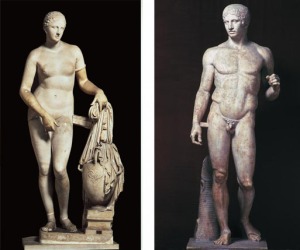Helene Cixous’s “The Laugh of Medusa” is written as a plea for women to write, in order to embrace changes that must be made to better the lives of all women. These changes include allowing themselves to thrive outside of domestic activities and to embrace all of their passions. Cixous urges women to use their bodies and physical beings as instruments of power. She opens the essay by stating, “Woman must write her self: must write about women and bring women to writing.” Feminine Gospels by Carol Ann Duffy embraces Cixous’s plea by writing about women, for women, and deeming her writing as ‘gospels’, which essentially means the ‘absolute truth.’ The poems within the collection are empowering for women, especially “Tall,” which describes a woman who is “bigger than any man” (Duffy 5), who continues growing and can see her reflection in the mirror “behind the top shelf” (Duffy 29). Although the speaker keeps growing and is illustrated and having a large impact on the world, the poem concludes by stating that the speaker is “colder, aloner, no wiser” (Duffy 46). I find it interesting that being alone is merged with being “no wiser,” and I think that Cixous’s argument can be applied to this. As one woman grows, if she does not develop and share her knowledge then she has no real effect on the world. As “Tall” demonstrates, the woman can be the largest thing in the world, but if her largeness has no impact on growing others, then she gets lost in the world. Cixous’s plea is for women to read her writing and help to spread her cause for the advancement of women. Women need to use their bodies, and as Duffy exemplifies the immensity that they can become, to create what Cixous describes a “body without end, without appendage, without ‘principal parts.’” This allows words to transcend the physical being, or the text on the page, but for the words and passions engulfed in these physical things to be set free and become a movement within the mass of people. The space that women occupy would then no longer be confined to one place; particularly the place of the domestic sphere, but allow women to grow and thrive as a mass in the world.
During our excursion to the British Museum, I also noticed something interesting that relates well to the idea of women succumbing to societal expectations. The Greek sculptures all portray the “ideal male body” in about the same light as it is illustrated today: the Adonis. However, the female, whose sculpture was located in the middle of the room surrounded by males, was nothing like how women are expected to look today. Her figure was realistic: curvy, not a defined stomach, well-nourished, and still equally as beautiful without being the stick-thin model that we see advertised today. I find this interesting because while women have gained a lot in the way of equality and fought oppression in so many areas, we still police our bodies to fit a nearly physically impossible mold. More books like Feminine Gospels should be written, the poetry empowers women and provides encouragement that physical beauty is not the only thing that makes us strong.
Interesting Links:
Blog Posts by Feminists in London TODAY.
Videos of Duffy Reading



Laura Laura Laura….great post :P! Carol Ann Duffy’s poetry is incredible because it writes about women, their history and roles in British society, and writes to everyone so they understand why women are where they are today. The poem “Tall” is such an important one in the collection, I love connection between alone and being no wiser that you make and how this means that is a woman is successful and has wisdom, she has to share it with the other women. Your explanation makes me think of A Room of One’s Own. Virginia Woolf urges women to write and keep writing, to develop a woman’s place in literature. She points out that yes, there have been a few successful women writers, but there needs to be many many more in order for women to begin to have a presence in literature. Same goes for the woman in Duffy’s poem. She must use her position of height, which can be read for a position of privilege, and use it to further women’s roles as a whole.
This interview with Duffy sheds some light on her poetry and how relevant it is to British society. In it she says that she can’t write poetry if it isn’t based on some personal or some public event, she has to wait for poetry to come to her when something happens. Thinking about this statement in regards to Feminine Gospels, Duffy’s message for women is meant to be contemporary and influence how women, especially women with knowledge and power, help further other women’s lives. The first thing that Duffy says in this interview, which is about her being chosen as the poet laureate, is that her “appointment celebrates the contribution of the great women poets we have in this country.” Her accomplishment is much more than a great achievement in her personal career; it’s a recognition of the work of many women and is meant to bring attention to all of the success of the women poets. Here we see Duffy practicing what she is preaching in “Tall” and other poems in her collection: use your accomplishments as a woman to help others!